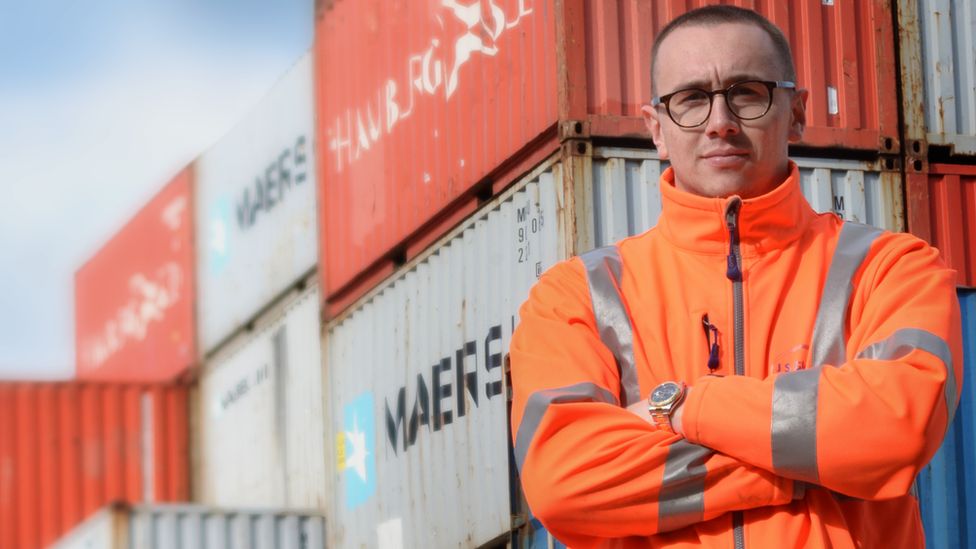ARTICLE AD BOX

Got a container of unwanted produce? Jake Slinn can help
By Michael Winrow
Technology of Business reporter
Not many people would know what to do with 18 containers filled with rotting cabbages.
The 23-year-old founder of JS Global operates in the cargo salvage industry - a small but essential cog in the machinery of global trade.
Last year one of the larger cogs in that machine got stuck in the Suez Canal. The world's biggest container ship, the Ever Given, blocked the key shipping lane for six days in March.
Part of that ship's cargo was the 18 containers, each weighing 20 tonnes, of cabbages that ended up with Mr Slinn. His Ipswich-based firm organised their delivery to an anaerobic digestion plant, where they were turned into fuel.
Cargo may need to be salvaged for a wide variety of reasons. Like the Ever Given cabbages, some goods may perish during their journey and need to be destroyed.
Image source, JS Global
Image caption,Cabbages that went off while stuck on the Ever Given were turned into biofuel
Local authorities may deem goods unsafe and order their destruction - a particular problem when Covid-19 hit.
"During the pandemic we destroyed tens of thousands of items of fake PPE, mainly fake masks and fake gloves, that had been imported from China," says Mr Slinn, whose parents are in the waste management business.
It's not only damaged or unsafe cargo that needs to be salvaged.
If a business goes bust, its cargo may be stranded at a port somewhere. If goods are delayed, they miss a key deadline, like Christmas, and may be abandoned.
Cargo can even be unwanted because the cost of storing the items at the port or in a nearby warehouse exceeds its value to its owner.
In such cases, a salvage company will often step in and find new buyers.
Image source, Getty Images
Image caption,The Ever Given container ship, operated by the company Evergreen, blocked the Suez Canal for almost a week in March 2021
Paul and Poppy Vidler of UK-based Crown Salvage have decades of experience of finding buyers for unwanted goods.
The company recently acquired containers of easy-to-assemble housing units and have been working on finding buyers.
"We sourced them from Turkey and have been having conversations with lots of people, from places like La Palma after the volcano [eruption in 2021] as well as Ghana.
"They can be set up quickly wherever there's a housing problem," says Mr Vidler.
With a big database of buyers around the world, they can take on large quantities of industrial goods, including chemicals and plastics.
"We're larger and global, it's not like that reality TV programme," Mrs Vidler explains, referring to US hit show Storage Wars, where contestants bid on storage units with the goal of profiting from the abandoned goods inside them.
The salvage companies say their work is good for the environment.
"We don't send anything to the landfill, not just because it's not good for the environment, but it's also not cost-effective," Mr Slinn says.
Mrs Vidler agrees. "We're not greenwashing. What we do actually helps avoid these things ending up in landfill."
Image source, Getty Images
Image caption,Containers need to be kept in circulation to keep global trade running smoothly
Aside from these environmental benefits, a more immediate benefit is that salvaging these goods helps release the handbrake on global trade, emptying containers that can then go back into circulation.
"We'll empty a container in the morning and it's already going back out on a ship empty by the afternoon," Mr Slinn says.
Getting containers back into circulation was a particularly pressing issue in the immediate aftermath of the Covid-19 pandemic.
In September 2021 the price of a 40ft (12m) container hit a high of almost $10,400 (£9,160), according to the World Container Index produced by analysts Drewry.
Since then the price has fallen back to around $2,773, well below the five-year average of around $3,759 according to the Index.
For those in the cargo salvage industry, delays, financial turmoil and strikes can all provide opportunities.
Image source, Getty Images
Image caption,A strike at the Port of Felixstowe in September caused cargo to be abandaoned
Recent industrial action in Felixstowe, the UK's largest container port resulted in an increase in abandoned cargo.
Mr Slinn disposed of a container of pork, which was due to be exported from the UK, but perished because the ship picking it up couldn't dock at the port.
"A lot of people were abandoning their stock because of the shutdown. It was a frustrating period for a lot of people but a good thing for us," Mr Slinn says.
Anything that makes life difficult for companies, like soaring energy prices, raises the likelihood that containers will be stranded.
Companies may be unable to afford the increased cost of storing goods in warehouses, while others may go out of business altogether, leaving their goods unwanted and stuck.
A tough economic environment provides opportunities for the salvage industry, but also comes with risk.
"There are also disasters we can be affected by," Mrs Vidler says.
Firms like hers rely on being able to connect buyers and sellers and being able to get goods to their destinations.
Whilst there is always uncertainty, the business is never dull, according to Mr Slinn.
"Every day is different, you never know what you're going to be dealing with."

 2 years ago
22
2 years ago
22








 English (US)
English (US)